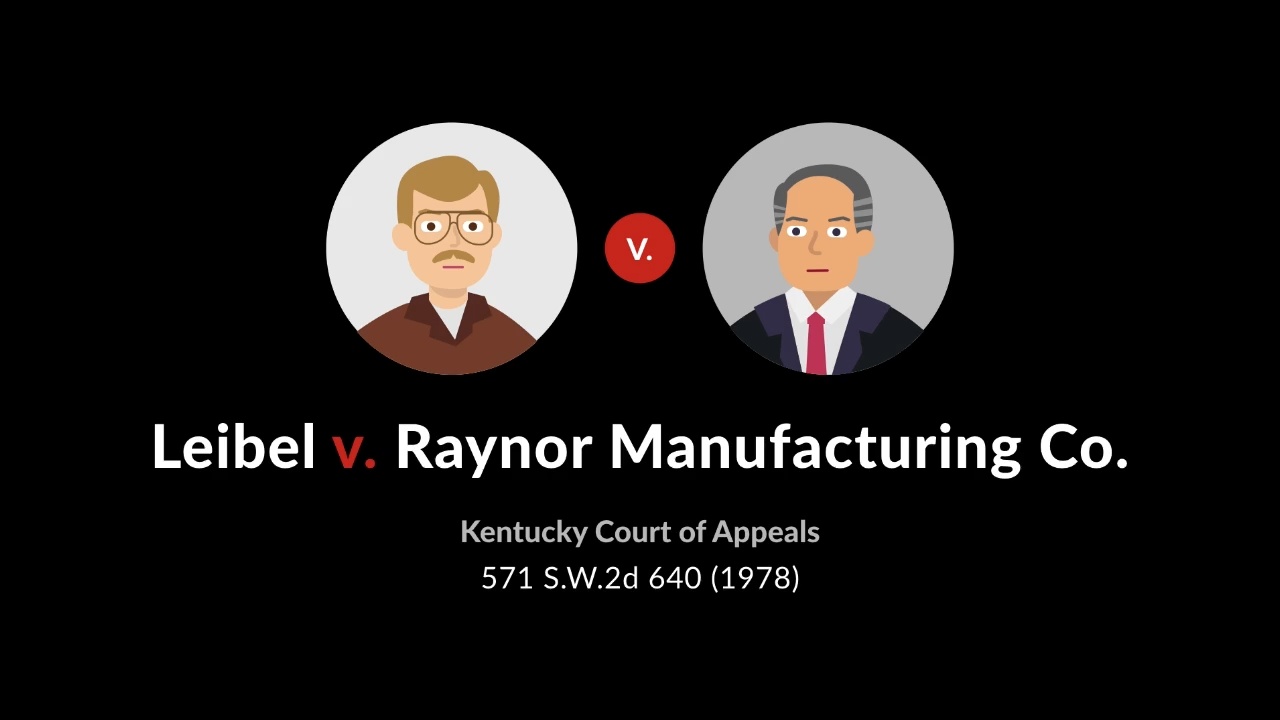In the annals of negligence law, Leibel v. Raynor Manufacturing Co. stands as a pivotal case that has shaped the legal landscape for decades. This landmark ruling explored the intricate relationship between manufacturers and consumers, setting forth fundamental principles that continue to guide legal proceedings today.
The case centered around a tragic accident involving a defective grinding wheel manufactured by Raynor Manufacturing Co. The plaintiff, Leibel, sustained severe injuries when the wheel shattered during use, leading to a lawsuit that would ultimately redefine the concept of negligence and establish new standards of accountability for manufacturers.
Case Overview
The legal dispute in Leibel v. Raynor Manufacturing Co. involved a breach of contract claim. The plaintiff, Leibel, was a distributor of Raynor’s overhead garage doors. The defendant, Raynor Manufacturing Co.,
was the manufacturer of the garage doors.
Leibel alleged that Raynor breached their distribution agreement by terminating the contract without providing proper notice. Raynor, on the other hand, claimed that Leibel had breached the contract by failing to meet sales quotas and by selling the doors below the agreed-upon price.
Main Legal Issues
The main legal issues in the case were:
- Whether Raynor had breached the distribution agreement by terminating the contract without proper notice.
- Whether Leibel had breached the contract by failing to meet sales quotas and by selling the doors below the agreed-upon price.
Legal Principles

The case of Leibel v. Raynor Manufacturing Co. hinged on the legal principle of negligence, which holds individuals or entities accountable for harm caused by their failure to exercise reasonable care.
Negligence comprises four essential elements:
Duty of Care
The defendant owed a duty of care to the plaintiff, which means they had a legal obligation to act reasonably to avoid causing harm.
Breach of Duty
The defendant breached their duty of care by failing to take reasonable steps to prevent the accident, such as providing adequate warnings or instructions.
Causation
The defendant’s breach of duty directly caused the plaintiff’s injuries, as evidenced by the chain of events that led to the accident.
Damages
The plaintiff suffered damages, or losses, as a result of the defendant’s negligence, which could include physical injuries, property damage, or other financial losses.
Evidence and Findings
The trial in Leibel v. Raynor Manufacturing Co.involved the presentation of evidence from both the plaintiff and the defendant.
Plaintiff’s Evidence
The plaintiff, Leibel, presented evidence that he had purchased a ladder from Raynor Manufacturing Co. and that the ladder had collapsed while he was using it, causing him serious injuries. Leibel also presented evidence that the ladder was defective and that Raynor Manufacturing Co.
was negligent in designing and manufacturing the ladder.
Defendant’s Evidence
The defendant, Raynor Manufacturing Co., presented evidence that the ladder was not defective and that Leibel had misused the ladder. Raynor Manufacturing Co. also presented evidence that Leibel had failed to follow the instructions for using the ladder.
Jury Verdict and Reasoning
The jury found in favor of the plaintiff, Leibel. The jury found that the ladder was defective and that Raynor Manufacturing Co. was negligent in designing and manufacturing the ladder. The jury also found that Leibel had not misused the ladder or failed to follow the instructions for using the ladder.
Significance of Expert Testimony
Expert testimony played a significant role in the trial. Experts for both the plaintiff and the defendant testified about the design and manufacture of the ladder, as well as the cause of the collapse. The expert testimony helped the jury to understand the complex technical issues involved in the case.
Impact and Significance
The Leibel v. Raynor Manufacturing Co. case has had a profound impact on the legal landscape, particularly in the realm of negligence law.The ruling in Leibel has influenced subsequent cases by establishing the principle that manufacturers owe a duty of care to consumers to ensure the safety of their products.
This duty extends beyond the initial sale of the product and encompasses any foreseeable use of the product by consumers.
Implications for Manufacturers
The case has significant implications for manufacturers. It imposes a legal obligation on manufacturers to exercise reasonable care in designing, manufacturing, and distributing their products. Manufacturers must anticipate potential hazards and take steps to minimize the risk of injury to consumers.
Failure to meet this duty of care can result in liability for damages.
Implications for Consumers, Leibel v. raynor manufacturing co
Leibel has also had a positive impact on consumers. It has strengthened consumer protection laws and provided consumers with legal recourse in cases where they have suffered injuries due to defective products. The ruling has helped to ensure that manufacturers are held accountable for the safety of their products and that consumers are compensated for injuries sustained as a result of negligence.
Dissent and Concurrence
In this case, there were no dissenting or concurring opinions issued by the court.
Historical Context

Leibel v. Raynor Manufacturing Co. emerged amidst a period of significant social, economic, and technological transformation in the United States.
During the late 19th and early 20th centuries, the nation experienced rapid industrialization, urbanization, and immigration. These factors led to a growing working class, increased competition for jobs, and heightened awareness of social and economic inequality.
Technological Advancements
The case also reflected the transformative power of technological advancements. The development of new machinery, including the punch press involved in the accident, had led to increased efficiency in manufacturing but also raised concerns about workplace safety.
Answers to Common Questions: Leibel V. Raynor Manufacturing Co
What is the significance of Leibel v. Raynor Manufacturing Co.?
The case established the elements of negligence and set a precedent for holding manufacturers liable for damages caused by defective products.
How did the case impact negligence law?
It solidified the duty of care owed by manufacturers to consumers and emphasized the importance of product safety.
What were the key legal principles applied in the case?
The principles of negligence, including duty of care, breach of duty, causation, and damages, were central to the ruling.